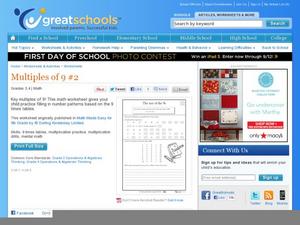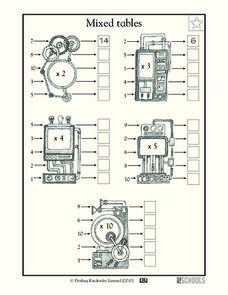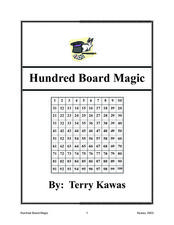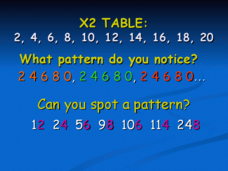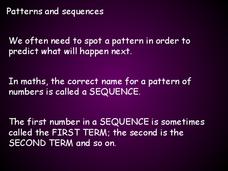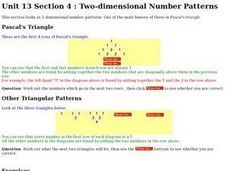Scholastic
Study Jams! Number Patterns
Finding patterns is an essential skill for mathematicians of all ages. Follow along with Zoe as she walks step-by-step through the process of identifying and completing number patterns. Work through the Try It! problems as a whole class...
Oregon Department of Education
Building and Expanding Patterns
The generation of a number, or shape pattern, is the focus of this math lesson. Pupils are presented with a variety of patterns shapes, and number patterns, then use worksheets embedded in the plan to gain further practice. The...
Oddrobo Software
King of Math Junior
Do your students have what it takes to be the king of math? Find out with this fun skills practice game that covers a wide range of topics from counting and basic operations to measurement and fractions.
PBS
Patterns to the Rescue!
Track down the Cyberchase episode that this instructional activity is associated with. Using a worksheet that is embedded in the plan, learners must find the next two numbers and shapes (a double pattern). Once these have been...
Curated OER
Multiplies of 9 #2
Reinforce the multiplying by nine as a number pattern. After completing sequences of the multiples of nine, pupils decipher a pattern in the entire nine times tables. Finally, they write down any patterns that they see. A great way to...
DK Publishing
Tracing Numbers, Part 2
Can your kindergartners write their numbers through 10? What about number patterns? This resource is a great way to get those training pencils moving! After tracing numbers 0 - 9, little writers continue three number patterns. Use this...
Curated OER
Multiplication Sequences
In this math instructional activity, learners learn that a sequence is a set of numbers which follows a mathematical rule. Students look at math sequences and fill in the missing numbers and also explain in words what the pattern is....
Curated OER
Mixed Tables
Who knows how to operate these multiplication machines? Young mathematicians examine five machines, each with a specific function (i.e. x3) to transform the input numbers to output numbers. They send five numbers through each machine,...
Curated OER
Multiples
Explore multiples of three and four with 18 sets of numbers. Learners examine each row and circle the multiples of three (for the first nine) and four (for the last nine). There is an example as reference, however none of these are...
Curated OER
Mixed Tables
These dinosaurs act like math machines as scholars practice their division skills. Each one has a given division function to apply to four incoming dividends. Pupils complete the equations, writing in the quotient for each. There...
Curated OER
Hundred Board Magic
Move around the hundred board to detect number patterns and relationships! This set of worksheets might actually work magic for your mathematicians as they begin to grasp the significance of the hundred board. For each of these, they...
Curated OER
Sequences
Provide your class with a comprehensive set of examples that help define sequences. They view a wide variety of sequences that range from animals, to letters and sounds. They work through each sequence to determine what should come next....
Curated OER
Pattern Practice
Finishing patterns can be fun and engaging. Here are nine different patterns that have learners determine the rule or determine which image or shape will come next in the sequence. A very well-done presentation.
Curated OER
Number Patterns and Sequences
In this finding the missing numbers in patterns and sequences worksheet, upper graders read a series of one-digit, two-digit, and three-digit numbers to solve the problems. They solve 10 problems.
Curated OER
Multiples of 2, 5, and 10
Build number sense and make learning multiples a simple task with this helpful presentation. The multiples of two, five, and ten are represented first as number patterns. Learners will be able to construct rules based on what they see....
Curated OER
Number Patterns
Which number comes next? The great part about this number sequencing worksheet is that it increases in difficulty so some learners who aren't challenged by the first few will definitely meet their match with the last couple. In each of...
Curated OER
Multiplication Tables: 9's Tricks
Who knew two hands could solve so many problems? Kids learn the 9's times tables trick with their fingers, then work through a series of 9's related math problems intended on building strong number sense and pattern recognition. Great...
Curated OER
Patterns and Sequences
A very well done slide-show defines and explains how numeric patterns and sequences work. Academic vocabulary is highlighted as well as solid examples and whole class practice. The last slide contains four number sequences for the class...
Curated OER
Number Sequences
Number sequences make for great challenges that stimulate pattern recognition, algebraic reasoning, and number sense. This slide-show includes eleven number sequences for learners to work through, an explanation of what number sequences...
Curated OER
Number Patterns
These patterns are perfect for learners brand new to counting. They examine 9 number sequences, completing the last two numbers. The codes are easy to crack here- they count by 1, 2, and 3. For a bonus sequence, scholars count by 10....
Curated OER
Quiz: Find a Pattern
Learners respond to 11 questions that require them to examine numbers and identify patterns. They also solve four math word problems regarding patterns.
Curated OER
Number Patterns in Everyday Life
Examine scenarios involving number patterns. Learners complete a series of activities, including working with Pascal's triangle ando completing chart activities based on different pricing for pizza toppings. An included extension has...
Curated OER
Two-dimensional Number Patterns
In this online two-dimensional number patterns learning exercise, students solve eight in-depth two-dimensional number patterns. Students check their answers as they go.
Curated OER
Number Patterns and Sequences
In this number patterns and sequences worksheet, learners find 7 formulas to represent a sequence. Students use a chart with sequences and they must find a formula to represent each sequence.






